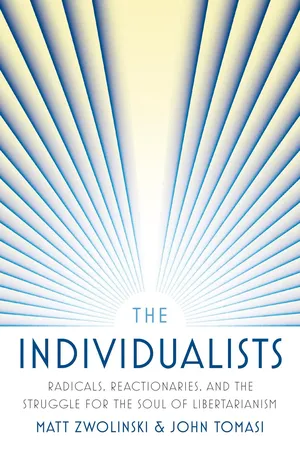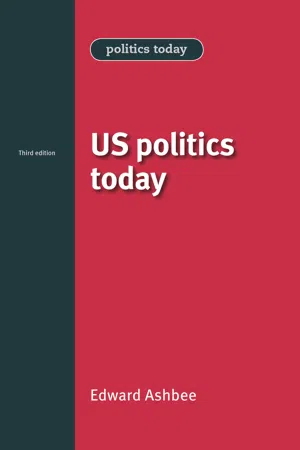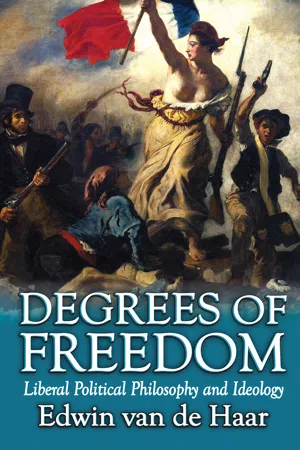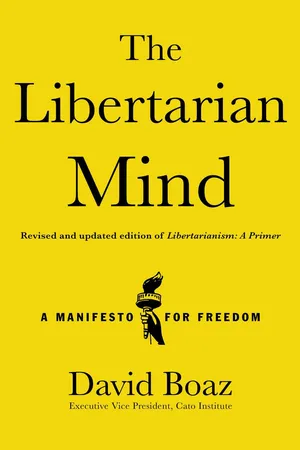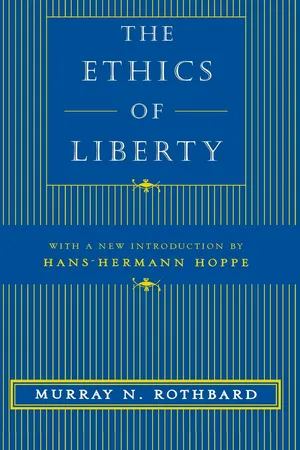Politics & International Relations
Libertarian Party
The Libertarian Party is a political party in the United States that advocates for individual liberty, free markets, and limited government intervention in people's lives. It was founded in 1971 and has since become the third-largest political party in the country. The party's platform includes issues such as gun rights, drug legalization, and non-interventionist foreign policy.
Written by Perlego with AI-assistance
Related key terms
Related key terms
1 of 4
Related key terms
1 of 3
7 Key excerpts on "Libertarian Party"
- eBook - ePub
The Individualists
Radicals, Reactionaries, and the Struggle for the Soul of Libertarianism
- Matt Zwolinski, John Tomasi(Authors)
- 2023(Publication Date)
- Princeton University Press(Publisher)
In its strict sense, libertarianism refers to a radical political view which holds that individual liberty, understood as the absence of interference with a person’s body and rightfully acquired property, is a moral absolute and that the only governmental activities consistent with that liberty are (if any) those necessary to protect individuals from aggression by others. Strict libertarianism emerged as a radicalized form of classical liberalism in the middle of the nineteenth century in the work of theorists such as Herbert Spencer, Fr é d é ric Bastiat, and Lysander Spooner. But the term “libertarian” is also used—sometimes by libertarians themselves and almost always in public discussions of libertarianism—in a broad sense to refer to anyone within what we have called the Liberty Movement: that loose group of intellectuals and activists united in their support of the broad goals of free markets and limited government. Friedrich Hayek, for example, is not a strict libertarian due to his philosophical methodology (broadly Humean and empiricist) and his policy positions (moderate and not radically anti-statist). But he is a libertarian in the broad sense. Murray Rothbard, by contrast, is a libertarian in both senses of the term. “Classical liberalism” likewise varies in common use, referring to both a historical and a contemporary ideology. In the former sense, it denotes a view developed in the sixteenth through nineteenth centuries by figures such as John Locke, David Hume, and John Stuart Mill. That view, as we have seen, adheres to a strong but defeasible presumption of liberty and holds this presumption to impose strict (but not radical) limits on the proper scope of government - eBook - ePub
- Bertrand Badie, Dirk Berg-Schlosser, Leonardo A. Morlino(Authors)
- 2011(Publication Date)
- SAGE Publications, Inc(Publisher)
Apart from economic liberalism, currently, LPs are once again stressing the values of religious tolerance and secularism as well as protection of lifestyle minorities. In addition, the new technological capacities for surveillance put the limitation of state powers back on the agenda of LPs.Transnational NetworksIn 1947, LPs formed the Liberal International (http://www.liberal-international.org ) for fostering some ideological coherence, cooperation, and support for emerging parties. Their membership list, sometimes with new entries and expulsions, provides at least an indicator for identifying LPs in times of decreasing clarity of labels. On a regional basis, the Alliance of Liberals and Democrats in Europe and its caucus in the European Parliament and in the Council of Europe represent a further step in transnational organization.Theo Schiller Philipps-Universität Marburg Marburg, GermanySee also Liberalism ; Neoliberalism ; PartiesFurther ReadingsDelury, G. E. (Ed.). (2006). World encyclopedia of political systems and parties . New York: Schlager Group.Kirchner, E. J. (Ed.). (1988). Liberal parties in Western Europe . Cambridge, UK: Cambridge University Press.Szajkowski, B. (Ed.). (2005). Political parties of the world (6th ed.). London: Harper.von Beyme, K. (1985). Parties in Western democracies . Aldershot, UK: Gower.LIBERALISMLiberalism offers a prescription of how the state is to deal with citizens: Loosely speaking, the state is to address citizens as equal individuals. The rise of liberalism therefore requires the prior or more or less simultaneous development of a strong principle and practice of individualism. There is a considerable literature on the roles of individualism and of individualist Protestantism in the development of capitalism but a far less rich discussion of its role in the development of political liberalism. This is not a little odd, because political liberalism is defined specifically for a society of individuals, and it requires constitutional protections of individual citizens against intrusions by the state. These three concepts—individualism, constitutionalism, and liberalism—are closely related historically, causally, and conceptually. Before turning to the structure or content of liberalism, there are two major preliminary issues to discuss here: an explanation of why liberalism came to its central place in political theory and practice when and where it did and some account of how it can be protected or enforced. - eBook - ePub
US politics today
Third edition
- Edward Ashbee(Author)
- 2013(Publication Date)
- Manchester University Press(Publisher)
populists ). In the closing decades of the nineteenth century, they campaigned for currency reform and against the railroad companies and other ‘trusts’ that had, they asserted, a monopoly hold over a particular market or sector of the economy. The populists won particular backing in the agricultural regions of the West and South that had been ravaged by economic depression during those years. In 1890, the party won control of the Kansas state legislature. However, they were increasingly divided between those who hoped to use the party so as to change the political character of the Democrats and those who sought to maintain the party’s independent identity.Many contemporary third parties can be considered ‘true minor parties’. The Libertarian Party (LP) was founded in December 1971. It is committed to ‘a world of liberty; a world in which all individuals are sovereign over their own lives, and no one is forced to sacrifice his or her values for the benefit of others’ (Libertarian Party, 2010). The LP puts forward a platform based around free market economics, the abolition of welfare provision, and minimal government. However, the Party distances itself from others on the right by calling for the legalisation of all victimless ‘crimes’, for example drug taking, and an end to restrictions on all forms of consensual sexual activity. Although the Greens may appear to be ‘one-issue obsessionists’, they have raised a range of issues associated with radicalism and feminism. During the 2000 election, when Ralph Nader stood as their candidate, they campaigned against the large corporations. The Reform Party could also be included within this category, although there is a case for adopting James Q. Wilson’s typology and categorising it as an economic protest party (Congressional Quarterly - eBook - ePub
Selfish Libertarians and Socialist Conservatives?
The Foundations of the Libertarian-Conservative Debate
- Nathan W. Schlueter, Nikolai G. Wenzel(Authors)
- 2016(Publication Date)
- Stanford Economics and Finance(Publisher)
CHAPTER TWO What Is Libertarianism? NIKOLAI G. WENZEL IT IS USEFUL FOR ME TO PAINT A PICTURE of the contemporary American political landscape before I define libertarianism.Years ago, I examined a chart of presidents under Mexico’s one-party dictatorship of the Institutional Revolutionary Party (Partido Revolucionario Institucional, or PRI), which ruled the country for roughly seventy years. The presidents in this chart veered from left to right and back, all within one party. From the libertarian perspective, the United States has lapsed into similar political seesawing within one de facto party, the “Republicrats.” George W. Bush, who rode into the White House as a free-market–leaning “compassionate conservative,” gave us the biggest nonmilitary increase in spending since Lyndon Johnson’s Great Society. Jimmy Carter, a “man of the people,” has also been dubbed the greatest free-market economist in the twentieth century, for leading (or allowing) the successful deregulation of trucking, airlines, and telecommunications. Barack Obama has blithely continued with the corporate welfare and failed drug war he inherited from his predecessor. Deficits and unfunded mandates soar.A back-of-the envelope calculation indicates that at least 60 percent of federal spending today is not authorized by the Constitution (if you have any doubt about this, compare the enumerated powers of Article 1, Section 8, with actual spending). Instead of constitutional constraint, we have big government. The national debt now stands at more than 100 percent of annual production (as Margaret Thatcher famously (if perhaps apocryphally) quipped, “The problem with socialism is that, eventually, you run out of other people’s money to spend”). Governments at all levels directly control about half of national economic activity (if we consider that 40 percent of gross domestic product (GDP) is made up of government spending at all levels, to which we can add another estimated 10 percent of GDP in compliance costs or stifled economic activity due to the tens of thousands of pages of regulations that are churned out every year).1 - eBook - ePub
Degrees of Freedom
Liberal Political Philosophy and Ideology
- Edwin Van de Haar(Author)
- 2018(Publication Date)
- Routledge(Publisher)
Although all liberal variants presented in this book have subdivisions, there is one particularly strong divide among libertarians. There are a number of libertarians who reject the state completely, while others argue the state is still needed for a small number of tasks (even though much fewer than in the classical liberal limited state). In both forms libertarianism remains completely entangled with capitalism, both believing that the market and private initiative are able to provide everything all people need for peaceful cooperation, meanwhile providing a better quality of service as well. Confusingly, in the United States the term libertarianism is sometimes also used for or by classical liberals. Yet this erroneously masks the differences between them.It is possible to discover libertarian roots in the works of some ancient thinkers2 and also in the works of the sixteenth-century French thinker Étienne de la Boétie, for instance Discourse of Voluntary Servitude (1548). However, the origins of libertarianism—just like those of social liberalism—are most often put in the nineteenth century. In France, for example, there was a group of economists that argued against the state, among whom were Charles Dunoyer and Charles Comte.3 The Belgian Gustave de Molinari was also a member of this group. In 1849 he argued that the logic of the market should extend to the “production of security,” or in other words national defense.4 Other libertarian movements emerged in England, and the United States, most notably in the struggle against slavery, by thinkers such as Benjamin Tucker.5Libertarianism is the smallest liberal variant, in terms of its number of supporters and in its influence. But it has developed and maintained itself as a clear third liberal alternative, particularly in the United States.6Libertarians take a principled position in political debate. In this way they also serve as “a liberal mirror” to other liberals. Often their views are dismissed as “extremist,” or they are given negative labels such as “ultra-liberals” or “hyper-liberals.” The world knows various libertarian political parties, but usually these have little, if any, influence. The most famous American libertarian politician, Ron Paul, decided to be a congressional representative for the Republican Party (albeit a maverick one). His son Rand is currently a U.S. senator and is regularly associated with the Tea Party movement, which also has a number of links to libertarianism. - eBook - ePub
The Libertarian Mind
A Manifesto for Freedom
- David Boaz(Author)
- 2015(Publication Date)
- Simon & Schuster(Publisher)
Libertarianism is sometimes accused of being rigid and dogmatic, but it is in fact merely a basic framework for societies in which free individuals can live together in peace and harmony, each undertaking what Jefferson called “their own pursuits of industry and improvement.” The society created by a libertarian framework is the most dynamic and innovative ever seen on earth, as witness the unprecedented advances in science, technology, and standard of living since the liberal revolution of the late eighteenth century. A libertarian society is marked by widespread charity undertaken as a result of personal benevolence, not left to state coercion.Libertarianism is also a creative and dynamic framework for intellectual activity. Today it is statist ideas that seem old and tired, while there is an explosion of libertarian scholarship in such fields as law, economics, history, philosophy, psychology, feminism, economic development, civil rights, education, the environment, social theory, bioethics, civil liberties, foreign policy, technology, privacy, and more. Libertarianism has developed a framework for scholarship and problem solving, and our understanding of the dynamics of free and unfree societies continues to develop.Beyond the academy, the broader impact of libertarian ideas derives from the growing network of libertarian magazines and organizations, the revival of traditional American hostility to centralized government, and most important, the continuing failure of big government to deliver on its promises. - eBook - ePub
- Murray N. Rothbard(Author)
- 2015(Publication Date)
- NYU Press(Publisher)
The Liberal begins the reign of ideas. How to distinguish the Whigs from the Liberal—One is practical, gradual, ready for compromise. The other works out a principle philosophically. One is a policy aiming at a philosophy. The other is a philosophy seeking a policy. 2 Libertarianism, then, is a philosophy seeking a policy. But what else can a libertarian philosophy say about strategy, about “policy”? In the first place, surely—again in Acton’s words—it must say that liberty is the “highest political end,” the overriding goal of libertarian philosophy. Highest political end, of course, does not mean “highest end” for man in general. Indeed, every individual has a variety of personal ends and differing hierarchies of importance for these goals on his personal scale of values. Political philosophy is that subset of ethical philosophy which deals specifically with politics, that is, the proper role of violence in human life (and hence the explication of such concepts as crime and property). Indeed, a libertarian world would be one in which every individual would at last be free to seek and pursue his own ends—to “pursue happiness,” in the felicitous Jeffersonian phrase. It might be thought that the libertarian, the person committed to the “natural system of liberty” (in Adam Smith’s phrase), almost by definition holds the goal of liberty as his highest political end. But this is often not true; for many libertarians, the desire for self-expression, or for bearing witness to the truth of the excellence of liberty, frequently takes precedence over the goal of the triumph of liberty in the real world
Index pages curate the most relevant extracts from our library of academic textbooks. They’ve been created using an in-house natural language model (NLM), each adding context and meaning to key research topics.
Explore more topic indexes
Explore more topic indexes
1 of 6
Explore more topic indexes
1 of 4
